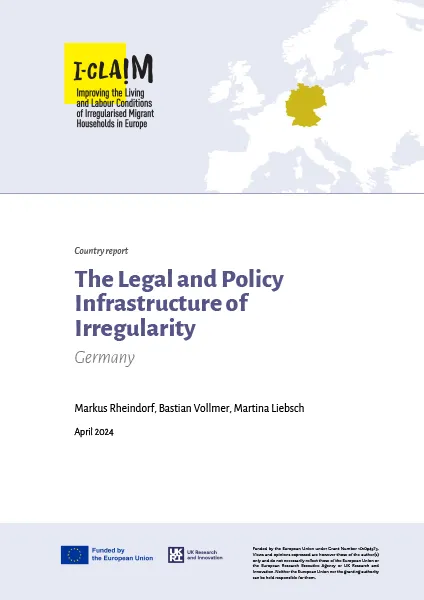The Legal and Policy Infrastructure of Irregularity: Germany
Markus Rheindorf, Bastian Vollmer, Martina Liebsch
How to cite:
Rheindorf, M., Vollmer, B. and Liebsch, M. (2024) The legal and policy infrastructure of irregularity: Germany. I-CLAIM. DOI:https://zenodo.org/records/11109547
The Legal and Policy Infrastructure of Irregularity: Germany
Markus Rheindorf, Bastian Vollmer, Martina Liebsch
The purpose of this report is to analyse the evolution of Germany’s migration policies, their legal framework, and their impact on irregularised migrants in Germany over the last 20 years. It emphasizes the non-essential yet impactful nature of irregularity as produced by a complex network of legal, social and economic conditions and practices, i.e., the irregularity assemblage. Following a brief historical contextualisation of migration policies in Germany through the 20th century, key terms pertaining to irregularity – and associated precarious situations – within the German legal framework are discussed, including irregular migration, residency, toleration, asylum, refugee, voluntary return, subsidiary protection, temporary protection, and freedom of movement. The following policy analysis focuses on the last 20 years (2004-2023), examining general trends, legal frameworks, and the intersection of migration with employment, social reproduction, and welfare regimes, drawing from academic literature, policy documents, interviews with key stakeholders as well as a first stakeholder group meeting in January 2024.
Although no official figures are available as to the number of irregular migrants in Germany, the report discusses recent estimates ranging between 180,00 and 520,000 as well as official statistics on groups that are at risk of becoming irregularised, such as tolerated individuals. Regarding key policy developments over the last decades, the report emphasises that many policy changes were precipitated by campaigns initiated by civil society organisations or NGOs, the expert Immigration Commission of 2001, and a number of church-affiliated initiatives such as the Malteser Medicine for Migrants. At the same time, international policies such as the EU’s General Plan to Combat Illegal Immigration and Trafficking in Human Beings and the UN’s Global Compact on Safe, Orderly and Regular Migration are impacting the national legal and policy framework in Germany – often proving difficult to implement.
Competing narratives and goals have continued to generate tension and conflict – for instance between the human rights perspective and Germany’s long-standing approach to migration as a police matter, i.e., as something that needs policing, as well as an unchanged administrative and societal conviction that migration is meant to fuel the Germany economy. This is evident, for example, in the clash between Germany’s official enshrining of irregular migrants’ access to healthcare or the right of irregular migrant children’s access to education and the legal obligation of administrative authorities (until recently also healthcare professionals and schools) to report irregular migrants.
The report highlights that national politics, especially anti-immigration and xenophobic political movements such as PEGIDA and Alternative für Deutschland, have been fuelled by recent crisis – most prominently the so-called “refugee crisis” of 2015 – and have sought to instrumentalise racist sentiments for political gain. Narratives propagated by these movements depict migrants, especially irregular migrants, as potential terrorists and criminals. Their campaigns have also brought to the fore narratives about “deserving” and “underserving” migrants or refugees, including the notion of the ‘genuine refugee’ as opposed to the ‘economic refugee’ who merely seeks to take advantage of the German state and/or economy. Recent crises have also fuelled political debates on Germany’s role within Europe and the EU regarding migration and security. Several narratives revolve around Germany’s moral leadership and responsibility, interconnecting with narratives about German, European or Christian values and the securitisation of migration.
The Covid-19 pandemic affected irregular migrants disproportionately hard, with scandals erupting around the living and working conditions of migrant workers in the agri-food sector (with a substantial portion being irregular). The German government’s responses were swift but focused on satisfying the German economy’s and consumers’ demands rather than safeguarding irregular migrants’ rights and well-being. Following the EU Temporary Protection Directive, Germany has granted individuals who have fled Ukraine since 24 February 2022 a special status and path to residency, gaining labour market access and social benefits.
It is only very recently that the German coalition government has made an attempt to reform policies regarding existing routes in and out of irregularity to reduce the vulnerability of irregular migrants as well as to facilitate ‘lane changes’ between different legal titles of residency. Overall, this will arguably improve the situation of migrants in or threatened by irregularity, while on the other hand the government has also intensified the so-called ‘fight’ against ‘illegal entry’ at Germany’s borders. An additional policy change has made it easier for ‘skilled workers’ to gain residency in Germany, very much in line with Germany’s economisation of migration. The report covers the most common pathways into and out of irregularity, specifically regarding family reunification, as well as deportation and criminalisation. As irregularity exacerbates migrants’ precarity and vulnerability, e.g., in the protection of their basic rights regarding healthcare, education, gender equality and exploitation, experience has shown that legal reforms alone often fail to change the everyday lived reality of irregularised migrants.
